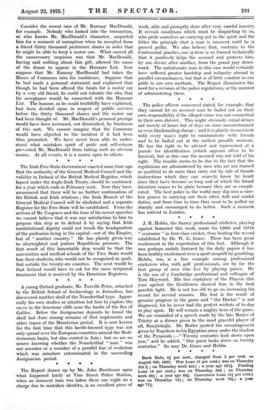Consider the recent case of Mr. Ramsay MacDonald, for example.
Nobody who looked into the transaction, or who knows Mr. MacDonald's character, suspected him for a moment of corruption when he accepted from a friend thirty thousand preference shares in order that he might be able to keep a motor car. What caused all the unnecessary suspicion was that Mr. MacDonald, having said nothing about this gift, allowed the name of the donor to appear in the Honours List. Now suppose that Mr. Ramsay MacDonald had taken the House of Commons into his confidence. SupPose that `he had made a personal statement and explained that though he had been offered the funds for a motor car by a very old friend, he could not tolerate the idea that his acceptance would be connected with the Honours List. The honour, as he could truthfully have explained, had been decided upon in respect of public services before the thirty thousand shares and the motor car had been thought of. Mr. MacDonald's personal prestige would have been increased, not diminished, by frankness of this sort. We cannot imagine that the Commons would have objected to the incident if it had been thus presented. We have never been able to under- stand what mistaken spirit of pride and self-esteem prevented Mr. MacDonald from taking such an obvious course. At all events, it is a course open to others.


































 Previous page
Previous page